For nearly two decades, Shunji Usui has been a fixture at Urawa Red Diamonds matches at the Saitama Stadium in the suburbs of Tokyo, a face in the crowd among the most avid — and sometimes rabid — fans of any Japanese soccer club.
In recent weeks, though, Usui’s pride in the former Asian champions has been tempered by embarrassment that the team he loves has been held up as a symbol of the kind of intolerance critics say has been emboldened by the conservative politics of Japanese Prime Minister Shinzo Abe.
On March 8, a banner with “Japanese Only” scrawled on it was hoisted on a stadium gate behind one goal, an area packed with thousands of the club’s hardcore fans. Despite complaints from onlookers, it remained in place until the end of the game.
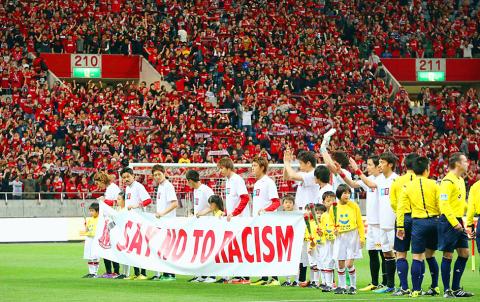
Photo: Reuters
In response, the Mitsubishi Motors-owned club was given the harshest punishment in the two-decade history of professional soccer in Japan — a J-League order that it play before an empty stadium.
That cost Urawa more than US$1 million in lost ticket sales. In addition, more than 10 Reds supporter groups, including UB Snake, the group responsible for the banner, were disbanded.
When the Reds returned home for a domestic cup game this week, flags and drums were banned, essentially putting fans on probation. The only banner allowed was one held up by a club official warning fans against discriminatory behavior.
“There are people who hate foreigners in Japan, and there are people who hate foreigners in this stadium,” said Usui, 53, a teacher at a local school. “By quietly standing by, we gave them a platform to voice such views, so it’s fair enough that now we have to pay for this.”
Although Japanese soccer has not suffered from the sort of hooliganism that has so often blighted the game in Europe and South America, Reds fans have a record of rowdiness.
In 2008, the club was fined nearly US$200,000 after a scuffle involving Gamba Osaka fans. In November last year, Urawa were fined US$96,000 after fans set off firecrackers near the bus of a rival team.
Supporters have also displayed the Rising Sun flag, a symbol used by the Japanese army during its colonization of Asia in the first half of last century that is seen by many as a painful reminder of Japan’s militaristic past.
However, the most recent incident in Urawa, which comes as Japan begins preparations for the 2020 Olympics, reignited a debate about Japanese identity and attitudes toward foreigners.
Many Urawa fans — and players — were quick to denounce the exclusionary banner.
Last week, more than a quarter of the 20,000 Reds fans who turned up for the first open-door home match since the incident signed a declaration condemning discrimination.
Urawa centerback Tomoaki Makino tweeted a picture of the controversial banner to his 177,000 followers and criticized fan behavior.
“My biggest regret is we didn’t take the flag down quickly enough,” Urawa president Keizo Fuchita said last week, vowing a zero-tolerance policy in the future.
However, critics see a worrying trend that goes beyond soccer.
Last year, hundreds of nationalists marched through the streets of Tokyo’s Korean district, Shin Okubo, with signs labeling Koreans as “cockroaches” and saying “Sink Koreans in the Tokyo Bay.”
Some human rights lawyers say Abe’s visit in December last year to the Yasukuni Shrine, which honors Japan’s wartime leaders, and controversial statements about history by those in his circle have created a climate that encourages far right sentiment.
The chairman of public broadcaster NHK, Katsuto Momii, made remarks, later retracted, that appeared to justify Japan’s wartime military brothels, saying all warring nations had similar institutions.
Another member of the NHK governing board, Abe appointment and prominent novelist Naoki Hyakuta, has said the Tokyo war tribunal after World War II was set up to cover up US atrocities.
“The very fact that those who put up the banner thought they would get away with it shows how people here don’t understand what racial discrimination means,” said Yoshiro Tanaka, holding his two-year-old daughter Yuzui on his lap behind Urawa’s goal at a game last week.
Like many other fans, Tanaka said what happened was not representative of the majority of Urawa supporters.
However, also like others, he feels sorry he let it go unchallenged.
“There’s a general mood that just allowed that kind of behavior to happen,” Tanaka said.
On Wednesday, Tanaka and his daughter watched as Urawa’s Tadanari Lee, a player of Korean heritage who was born in Tokyo, but only obtained Japanese nationality in 2007, scored one goal and set up a second, a dramatic winner three minutes from time.
“I’m so glad we managed to come back after the scandal with a win,” Tanaka said. “We must create a place that will be inclusive for everyone, so that my daughter and I can keep coming back for many years to come.”
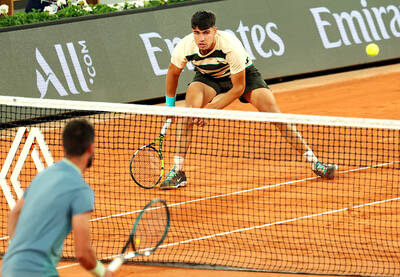
FRUSTRATION: Alcaraz made several unforced errors over four sets against Bosnian Damir Dzumhur, who had never made it past the third round in a major competition Defending champion Carlos Alcaraz reached the fourth round of the French Open after laboring past Damir Dzumhur 6-1, 6-3, 4-6, 6-4 in the Friday night session. The second-seeded Spaniard had never before played Dzumhur, a 33-year-old Bosnian who had never been past the third round at any major tournament. “I suffered quite a lot today,” Alcaraz said. “The first two sets was under control, then he started to play more deeply and more aggressively. It was really difficult for me.” Dzumhur hurt his left knee in a fall in the second round, and had treatment on Friday on his right leg during the
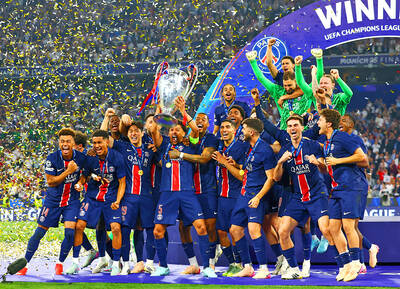
‘DREAM’: The 5-0 victory was PSG’s first Champions League title, and the biggest final win by any team in the 70-year history of the top-flight European competition Paris Saint-Germain won the Champions League for the first time as Luis Enrique’s brilliant young side outclassed Inter on Saturday in the most one-sided final ever with teenager Desire Doue scoring twice in an astonishing 5-0 victory. Doue supplied the pass for Achraf Hakimi to give PSG an early lead and the 19-year-old went from provider to finisher as his deflected shot doubled the advantage in the 20th minute. Doue scored again just after the hour mark, ending any doubt about the outcome before Khvicha Kvaratskhelia ran away to get the fourth and substitute Senny Mayulu, another teenager, made it five. Inter were
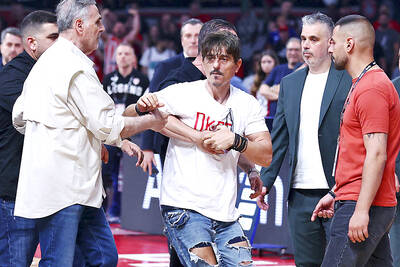
The Greek basketball league finals between Panathinaikos and Olympiakos were suspended by the government on Monday following on-court scuffles involving rival security teams. The best-of-five series is at 1-1. The third game, scheduled for today, has been postponed. The owners of both clubs were summoned to meet with the country’s sports minister. They “will be asked to provide explicit guarantees that this situation will be brought to an end. If not, this year’s championship will be definitively canceled,” government spokesman Pavlos Marinakis said. “There can be no tolerance for such pathological phenomena of violence and delinquency.” In online posts, the owners of Panathinaikos and
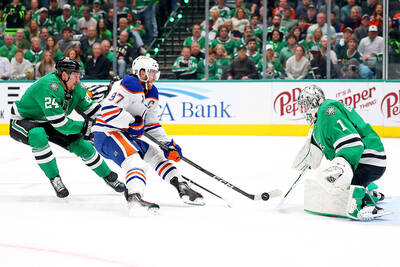
The Edmonton Oilers on Thursday defeated the Dallas Stars 6-3 to book their place in the Stanley Cup Finals, setting up a repeat of last year’s NHL showpiece against reigning champions the Florida Panthers. The Oilers, bidding to become the first Canadian team to win the NHL’s championship series since the 1993 Montreal Canadiens, head to Florida for Game 1 of the best-of-seven series set for Wednesday. Florida, who are to play in the NHL showpiece for the third straight season, won last year’s title 4-3 to extend Canada’s decades-long Stanley Cup drought. Connor McDavid led Edmonton back to the championship series on